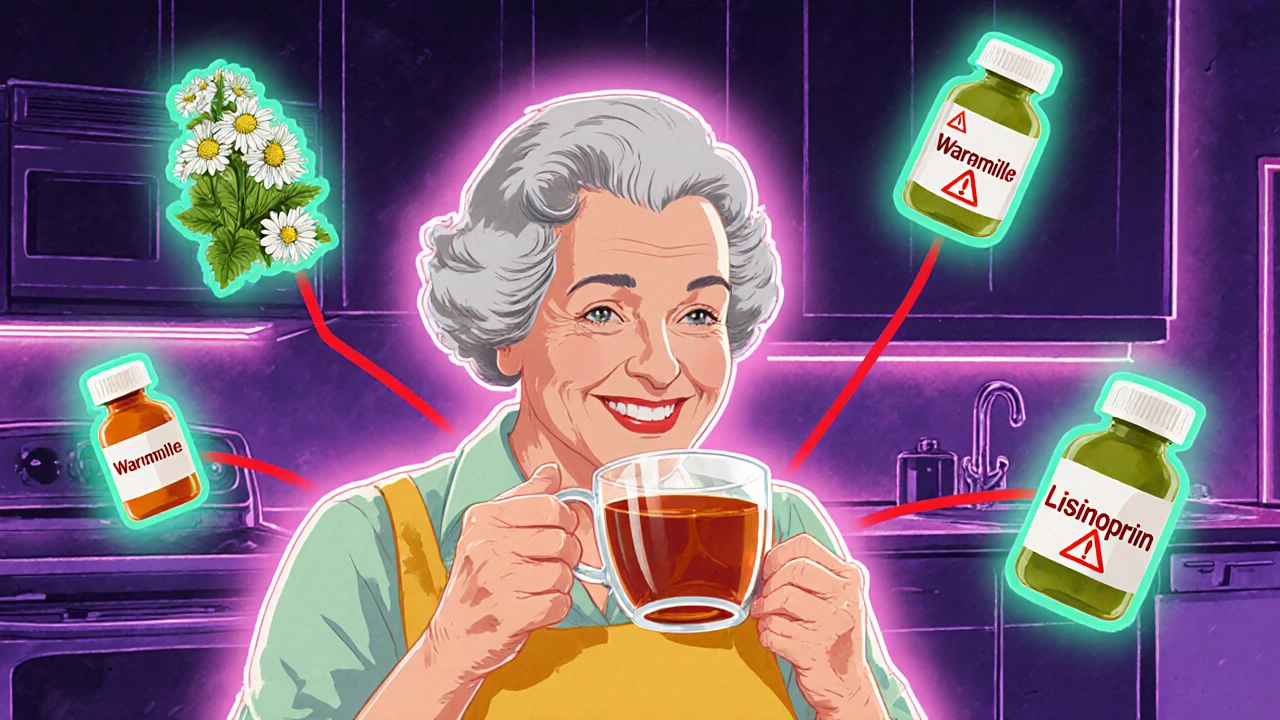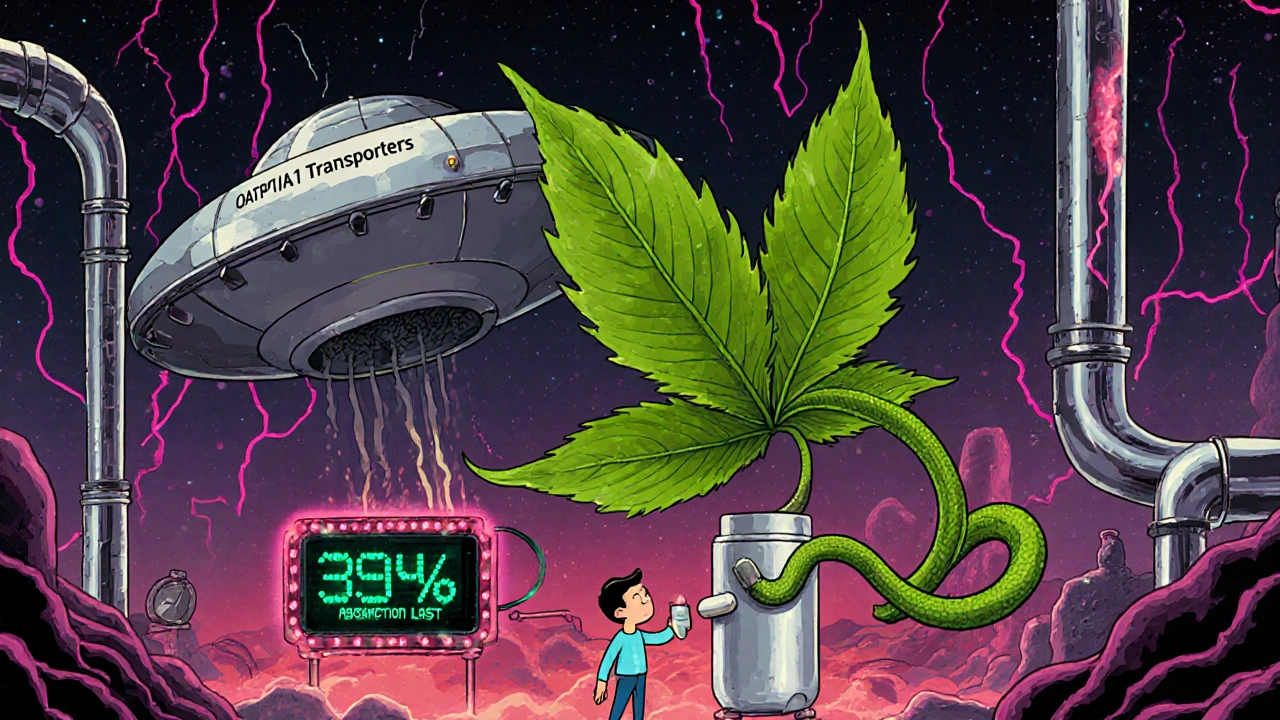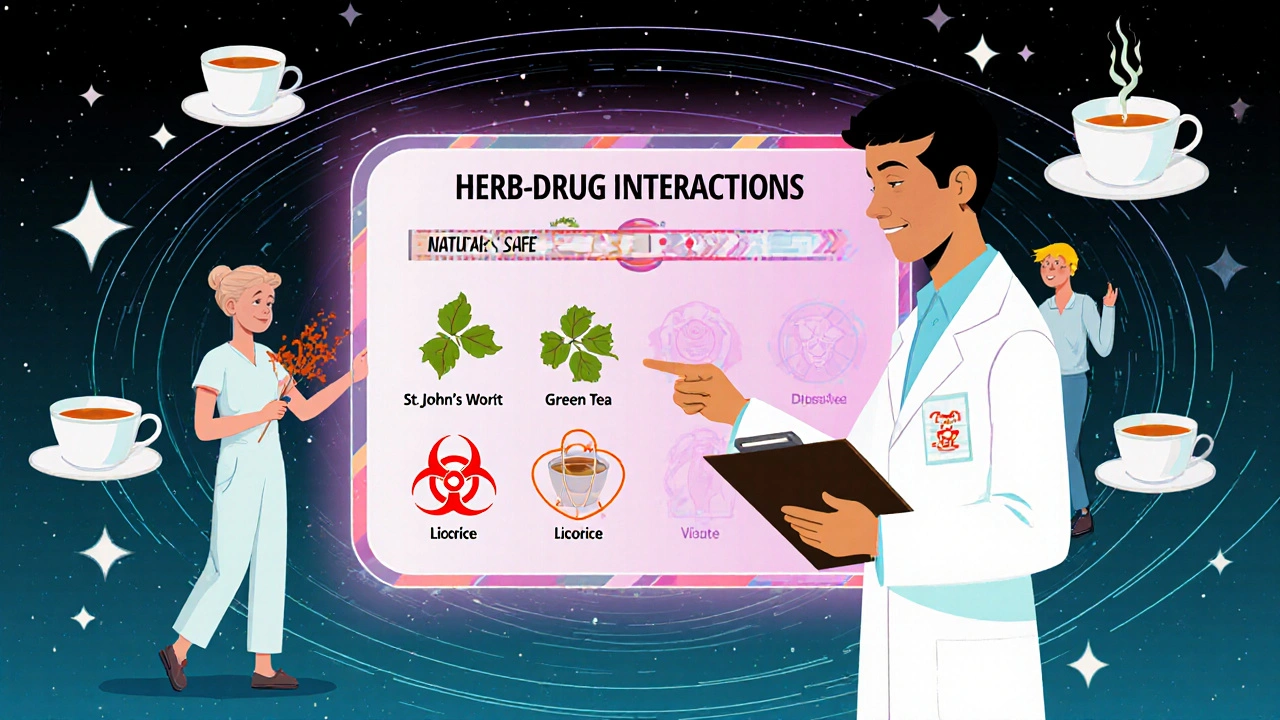Herbal Teas and Medications: Potential Interactions You Need to Know
 Nov, 12 2025
Nov, 12 2025
Many people sip herbal teas thinking they’re harmless-just a warm, natural drink. But if you’re taking prescription meds, that cup of chamomile, green tea, or hibiscus could be doing more than soothing you. It might be making your medication less effective-or worse, pushing your body into danger.
Why Herbal Teas Aren’t Just ‘Natural’
Herbal teas aren’t tea in the traditional sense. They don’t come from the Camellia sinensis plant. Instead, they’re made from roots, flowers, seeds, or leaves of other plants-like chamomile, ginger, or hibiscus. Because they’re sold as ‘dietary supplements’ under U.S. law, they don’t go through the same safety testing as drugs. That means no one checks how they interact with your blood pressure pills, antidepressants, or blood thinners before they hit the shelf.Here’s the reality: 23% of U.S. adults use herbal supplements, and a big chunk of those are in tea form. But only about 1 in 4 people tell their doctor about them. That’s a huge gap. Your pharmacist might know your lisinopril and your metformin-but they won’t know you’ve been drinking two cups of hibiscus tea every morning to lower your blood pressure. And that’s where things get risky.
Green Tea: The Silent Drug Thief
Green tea is one of the most popular herbal teas worldwide. But don’t let its reputation as a healthy drink fool you. When it comes to medications, green tea can act like a thief-stealing your drugs’ effectiveness.Studies show that drinking strong green tea can slash the blood levels of the cholesterol drug atorvastatin by up to 39%. It can also reduce the absorption of the beta-blocker nadolol by 85%. That’s not a small drop. It’s enough to make your medication useless.
Why? Green tea contains compounds that block special transporters in your gut called OATP1A1 and OATP1A2. These are the gates that let drugs like statins, antibiotics, and even HIV meds into your bloodstream. When green tea clogs those gates, your body doesn’t get the full dose. You might think your pills aren’t working-when really, it’s your tea.
Even worse, green tea can boost levels of other drugs like simvastatin by over two times, thanks to its effect on P-glycoprotein. Too much of a drug can be just as dangerous as too little. In some cases, this has led to muscle damage, liver stress, and hospital visits.
St. John’s Wort: The Mood Killer
If you’re taking antidepressants, anti-anxiety meds, or even birth control pills, St. John’s wort tea is a red flag. This herb speeds up the liver’s ability to break down drugs-so fast that your body flushes them out before they can do their job.It’s been shown to cut the levels of warfarin, cyclosporine, and birth control pills by up to 60%. That means you could get pregnant on the pill, or your transplant medication could fail. Even worse, it can interfere with SSRIs and cause serotonin syndrome-a rare but life-threatening condition where your brain gets flooded with serotonin.
Doctors have seen cases where patients stopped responding to their antidepressants after starting St. John’s wort tea. They thought their depression was getting worse. It wasn’t. The tea was just clearing the drug from their system.

Chamomile, Hibiscus, and Ginkgo: The Bleeding Risk Trio
Chamomile tea is often used for sleep and digestion. Hibiscus tea is popular for lowering blood pressure. Ginkgo biloba tea is taken for memory. All three can interfere with blood thinners like warfarin or clopidogrel.Chamomile contains apigenin, which may interfere with how your liver processes hormones-including those in birth control pills. Early studies suggest it could make them less effective.
Hibiscus tea works like an ACE inhibitor, the same class of drugs used to treat high blood pressure. If you’re already taking lisinopril or enalapril, drinking hibiscus tea can drop your blood pressure too low-sometimes below 90 mmHg. That can cause dizziness, fainting, or even kidney damage.
Ginkgo biloba is a known blood thinner. The American Heart Association warns people on anticoagulants to avoid it. There have been documented cases of brain bleeds in older adults who took ginkgo with warfarin. It’s not just a theory-it’s happened.
Goldenseal and Licorice: Hidden Triggers
Goldenseal, sometimes brewed as a tea, is sold as an immune booster. But it’s one of the most dangerous herbs for medication users. It blocks two key liver enzymes-CYP2D6 and CYP3A4-that break down over half of all prescription drugs.That means it can spike levels of drugs like digoxin, theophylline, and lithium. Too much digoxin can cause fatal heart rhythms. Too much lithium can lead to tremors, confusion, and kidney failure.
Then there’s licorice. Often found in herbal blends for digestion or stress, licorice can lower potassium levels. If you’re on diuretics or heart meds, this can trigger dangerous heart arrhythmias. Even a few cups a week can do it.

Who’s at Highest Risk?
You’re at greater risk if you:- Take medications with a narrow therapeutic index-like warfarin, digoxin, cyclosporine, or theophylline
- Are over 65 and on multiple medications (polypharmacy)
- Use herbal teas daily, not just occasionally
- Buy herbal tea blends with 5+ ingredients-where the interactions are unknown
- Assume ‘natural’ means ‘safe’
Older adults are especially vulnerable. They’re more likely to take several medications and more likely to drink herbal teas for joint pain, sleep, or digestion. But their bodies process drugs slower, so even small interactions can become big problems.
What Should You Do?
You don’t have to quit herbal teas entirely. But you need to be smart about them.- Make a list-write down every tea, supplement, or herb you take, including how often and how much. Don’t forget ‘just a cup’ of chamomile before bed.
- Bring it to every appointment-show your doctor or pharmacist your list. Don’t wait for them to ask. Most won’t.
- Avoid green tea if you’re on statins, beta-blockers, or antidepressants.
- Skip St. John’s wort if you’re on any psychiatric meds or birth control.
- Hold off on hibiscus, ginkgo, or chamomile if you’re on blood thinners or blood pressure meds.
- Don’t mix herbal blends-the more ingredients, the harder it is to know what’s interacting.
The FDA says it plainly: ‘Natural doesn’t mean safe.’ Just because something comes from a plant doesn’t mean your body won’t react badly to it-especially when mixed with medicine.
When in Doubt, Pause
If you’re unsure whether a tea is safe with your meds, stop drinking it for a week. Then talk to your pharmacist. They can check databases that track herb-drug interactions. If you notice new dizziness, unusual bruising, heart palpitations, or your meds seem less effective after starting a new tea-call your doctor immediately.Herbal teas can be part of a healthy routine. But they’re not harmless. When they meet medication, they become part of a chemical conversation your body didn’t ask for. The safest choice? Talk first. Sip later.
Can I drink green tea if I’m on cholesterol medication?
It’s not recommended. Green tea can reduce the absorption of statins like atorvastatin by up to 39%, making them less effective. If you drink green tea regularly, talk to your doctor about switching to a non-tea herbal option or adjusting your medication dose. Avoid concentrated green tea extracts entirely.
Is chamomile tea safe with birth control pills?
It might not be. Chamomile contains apigenin, which may interfere with liver enzymes that process hormones. Early studies suggest it could lower the effectiveness of oral contraceptives. If you rely on the pill for birth control, avoid chamomile tea or use a backup method. Talk to your OB-GYN about safer alternatives.
Does hibiscus tea lower blood pressure too much if I’m already on medication?
Yes, it can. Hibiscus tea acts like an ACE inhibitor, similar to drugs like lisinopril. Combining them can cause your blood pressure to drop dangerously low-below 90 mmHg. Symptoms include dizziness, fainting, and fatigue. If you’re on blood pressure meds, avoid hibiscus tea unless your doctor approves it and monitors your levels closely.
Can I drink ginger tea if I’m on blood thinners?
Ginger has mild blood-thinning properties. While a small amount in food is usually fine, drinking ginger tea daily-especially strong brews-can increase bleeding risk when combined with warfarin, aspirin, or clopidogrel. If you’re on anticoagulants, limit ginger tea to one cup a day or avoid it altogether. Watch for bruising, nosebleeds, or unusual bleeding.
Why don’t doctors always warn me about herbal teas?
Many doctors don’t ask about herbal teas because they’re not trained to think of them as drugs. Patients often don’t mention them because they don’t see tea as a ‘supplement.’ But research shows over 70% of older adults use herbal products-and most don’t tell their providers. It’s up to you to bring it up. Bring your tea list to every appointment.
Are organic or ‘premium’ herbal teas safer?
No. Organic doesn’t change the chemical compounds in the plant. A premium hibiscus tea still contains the same ACE-inhibiting compounds as a cheap one. The risk comes from the herb itself-not how it’s grown or marketed. Always check the ingredient list, even for ‘natural’ or ‘organic’ brands.
Karla Luis
November 12, 2025 AT 23:16Also green tea with my statin? Yeah that was a disaster. Cholesterol didn't budge for months. Turns out my tea was blocking the drug. Now I drink rooibos. No drama.
jon sanctus
November 14, 2025 AT 06:53Kenneth Narvaez
November 14, 2025 AT 17:30Patients need structured medication reconciliation protocols that include phytochemical intake.
Christian Mutti
November 15, 2025 AT 02:48Liliana Lawrence
November 15, 2025 AT 11:02Sharmita Datta
November 15, 2025 AT 18:45mona gabriel
November 17, 2025 AT 10:52Phillip Gerringer
November 19, 2025 AT 04:42jeff melvin
November 20, 2025 AT 03:29Matt Webster
November 22, 2025 AT 02:13Karla Luis
November 22, 2025 AT 02:31